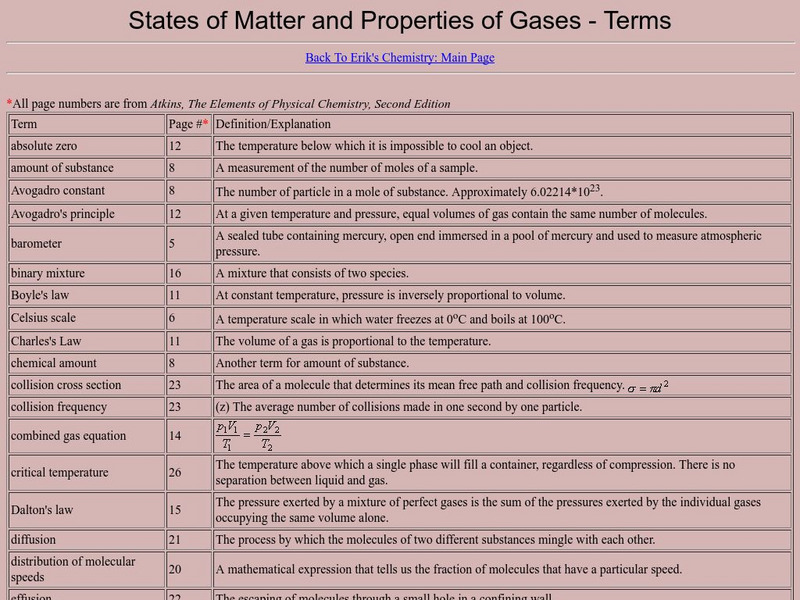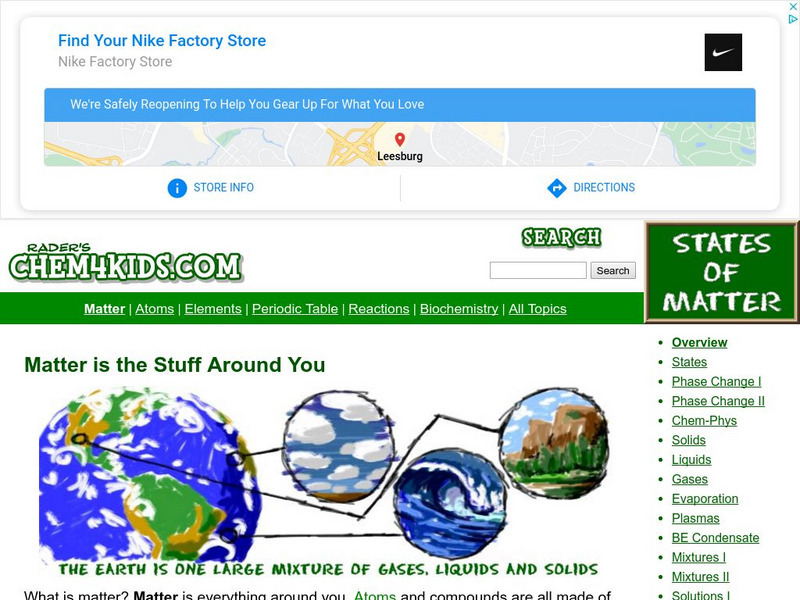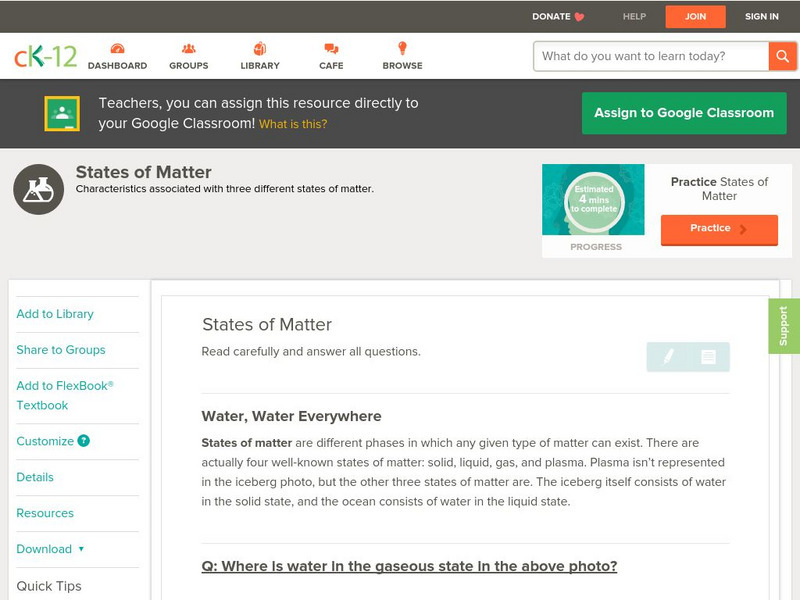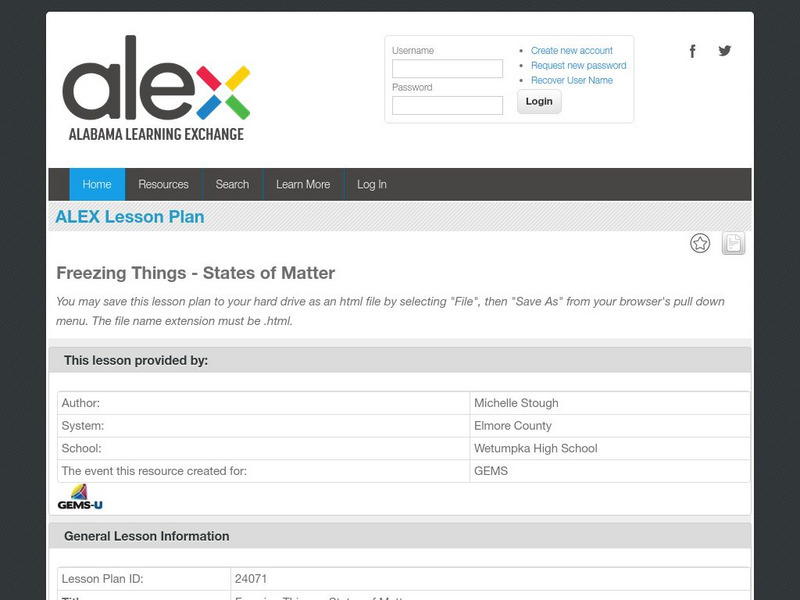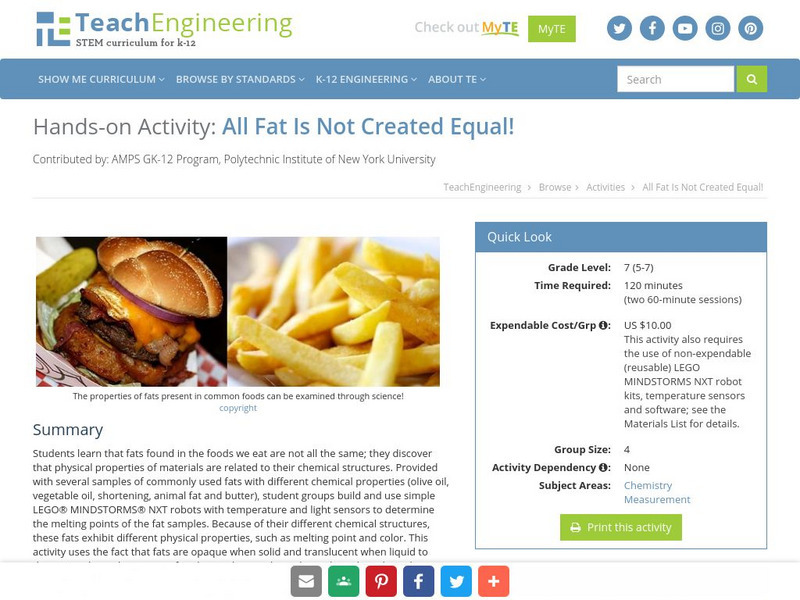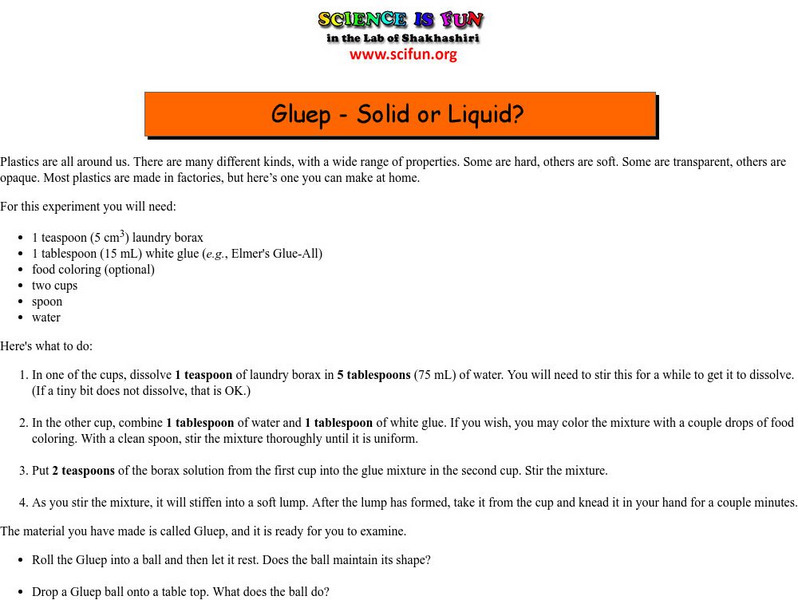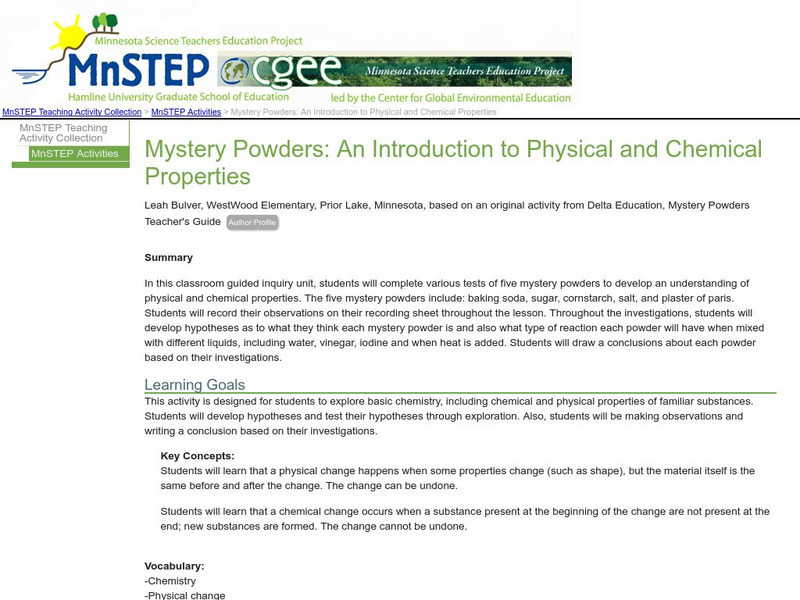Hi, what do you want to do?
Other
States of Matter and Properties of Gases: Terms
A very complete list of terms that are important to the study of gases. This resource is a web archive.
TeachEngineering
Teach Engineering: How Cold Can You Go?
Students explore materials engineering by modifying the material properties of water. Specifically, they use salt to lower the freezing point of water and test it by making ice cream. Using either a simple thermometer or a mechatronic...
Chem4kids
Chem4 Kids: Matter
"Matter is everything." So begins this comprehensive website on the physical and chemical properties of matter in its four main states: solids, liquids, gases, and plasmas. The text is large and easy-to-read. Students will enjoy the...
New York University
Nyu: Welcome to Water
Educational resource invites users to understand the properties of water by first examining what water is and how we use it and then leads users to further information on the three states that water can exist.
Wikimedia
Wikipedia: Materia
Explore the concept of matter in this Spanish-language encyclopedia entry. This site features the properties of matter, the Law of Conservation of Matter, and other important features of matter.
CK-12 Foundation
Ck 12: Chemistry: States of Matter
[Free Registration/Login may be required to access all resource tools.] Definition of state of matter and the three common states of matter and their differences.
Chem Tutor
Chem Tutor: Chemistry: States of Matter
This lesson focuses on the states of matter: solids, liquids, and gases. It also discusses the Kinetic Theory of Matter, Thermodynamics, Triple point, Phase Change Graphs and the Heating Curve of Water. It provideds adrawing of a heating...
Other
Lunar and Planetary Institute: Explore! Ice Worlds
Features a collection of hands-on activities, investigations, and explorations designed to engage students in learning about ice, both in the solar system and on planet Earth.
Alabama Learning Exchange
Alex: Freezing Things: States of Matter
The class will go back over the Power Point presentation on chemical and physical properties. The teacher will then conduct numerous liquid nitrogen demos. This instructional activity is used early in the Chemistry course. The students...
Other
Science4us: States of Matter
In the States of Matter module, students further explore the concept that anything on earth that has mass and takes up space is matter. This exercise introduces students to solids, liquids and gases, the three most common states of...
Simon Fraser University
Chem1 Virtual Textbook: Densities of Substances and Materials
As part of a larger site called "Getting started in Chemistry," this site examines various topics related to the densities of substances and materials. Included in the study are properties of solids, liquids and gases, and how density is...
TeachEngineering
Teach Engineering: Measuring Viscosity
Students calculate the viscosity of various household fluids by measuring the amount of time it takes marble or steel balls to fall given distances through the liquids. They experience what viscosity means, and also practice using...
BioEd Online
Bio Ed Online: What Is the Water Cycle?
In this lesson students will create and investigate a simple model of the water cycle. Student sheets are provided in English and in Spanish.
eSchool Today
E School Today: What Is Matter
Learn about matter, its three states, changes of state, how matter behaves, and physical and chemical changes in matter.
New York University
New York University: States of Water
Use this resource to learn about the three different phases of water; solid, liquid, and gas. What happens to water as it changes into a solid or gas? Includes short and easy to do activity.
Chem Tutor
Chem Tutor: States of Matter
A very descriptive site that allows students to understand the different states of matter at the atomic level. Also discusses the process of phase changes and displays phase change graphs. Thermochemistry is also touched upon for high...
TeachEngineering
Teach Engineering: How Far Does a Lava Flow Go?
While learning about volcanoes, magma and lava flows, students learn about the properties of liquid movement, coming to understand viscosity and other factors that increase and decrease liquid flow. They also learn about lava composition...
Concord Consortium
Concord Consortium: What Makes Water Special?
Activity 2 investigates Why is water different from other liquids? This activity will discover the properties of different liquids. Students will explore what makes honey gooey and thicker than water. And why some liquids evaporate...
TeachEngineering
Teach Engineering: All Fat Is Not Created Equally!
Students learn that fats found in the foods we eat are not all the same; they discover that physical properties of materials are related to their chemical structures. Provided with several samples of commonly used fats with different...
TED Talks
Ted: Ted Ed: Why Does Ice Float in Water?
Ever wonder why solid ice floats in liquid water? In this video lecture you will explore the special properties of water. Learn "the science behind how hydrogen bonds keep the ice in your glass (and the polar ice caps) afloat". At the...
PBS
Pbs Teachers: Make Some Zlime
Explore properties of matter by making a slimy substance out of cornstarch and water then noticing how it reacts to pressure.
Science is Fun
Science Is Fun: Gluep Solid or Liquid?
In this experiment, students create a polymer substance called Gluep, then investigate its properties. Includes a detailed explanation of how the polymer molecules bond together to form the plastic.
Science Education Resource Center at Carleton College
Serc: Mystery Powders: An Introduction to Physical and Chemical Properties
Students will complete various tests of five mystery powders to develop an understanding of physical and chemical properties. They will record their observations and develop hypotheses as to what they think each mystery powder is and...





